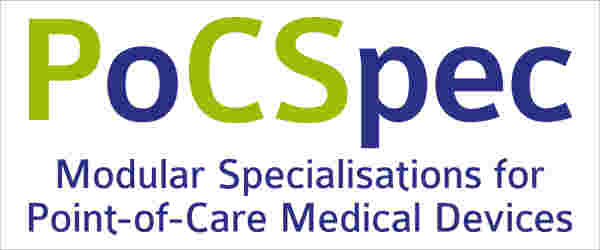Project titel
PoCSpec – Modular Specialisations for Point-of-Care Medical Devices
Project period
2019 – 2021
Projekt description
The networking of the many computer-controlled medical devices available in a modern operating room (OR) has been gaining in importance for years, because it is the only way to meet the clinical need for more safety, efficiency and ergonomics in the OR. A challenge so far was the networking of devices from different manufacturers. Here, the German research project “OR.NET – Secure Dynamic Networking in the Operating Room and Clinic” (2012-2016) laid important foundations in the form of a service-oriented communication protocol for the dynamic cross-vendor networking of medical devices, which is now part of the ISO/IEEE 11073 “Service-oriented Device Connectivity” series of standards, an internationally recognized standard.
However, a problem in the use of the new standards so far was that manufacturers can model the network representation of similar devices differently, which complicates the integration into a system of networked medical devices as well as testing and approval of networked devices. This is where the project “PoCSpec – Modular Specializations for Point-of-Care Medical Devices”, co-ordinated by OFFIS and funded by the Federal Ministry for Economic Affairs and Energy, from 2019 – 2021 came in. The project developed additions to the ISO/IEEE 11073 family of standards that specified the networking requirements for specific device categories, i.e. the scope, structure and significance of the data and services offered in the network as well as the behavior of the device at runtime, so that devices from different manufacturers can be uniformly monitored and controlled via the network. This was implemented as an example for two particularly complex device categories: endoscopy and high-frequency surgery.
Project partner
Apart from OFFIS, the partners of the project are the companies Aesculap, BOWA, Dräger (associated), embeX, Erbe Elektromedizin, Karl Storz, Olympus Winter & Ibe, Open Connections, Schölly Fiberoptic (associated), Söring (associated), steute Technologies (associated) and surgiTAIX (associated) as well as the Institute for Applied Microelectronics and Data Technology (IMD) of the University of Rostock and the Institute for Medical Informatics (IMI) of the University of Lübeck.
In the PoCSpec project, these standards for equipment in the fields of high-frequency surgery and endoscopy are to be worked out. This will achieve a higher level of interoperability and enable the interchangeability of medical devices from different manufacturers during operation. This will sustainably strengthen Germany’s excellent international competitive position for medical devices.
The clinical need for more safety, hygiene, efficiency and ergonomics is a constant driver for OR networking as the technology of the OR increases. The ISO/IEEE 11073 series of standards “Service-oriented Device Connectivity (SDC)” enables the integration of medical devices on the basis of modern web technologies. These results are largely the result of the BMBF-funded research project “OR.NET – Secure Dynamic Networking in Operating Rooms and Clinics”, but so far various manufacturers have modelled the network representation of very similar devices differently. This makes integration into a system of networked medical devices just as difficult as testing and approving networked devices, and the need for supplementary standards has been identified both among companies and in the responsible IEEE 11073 Point of Care Devices Working Group. So-called “Device Specialisations” define the networking requirements for a device type, i.e. the scope, structure and semantics of the data and services offered in the network as well as the behaviour of the device at runtime. In addition, “Module Specifications” offer partial models that each model a function and can be referenced by several Device Specialisations.


